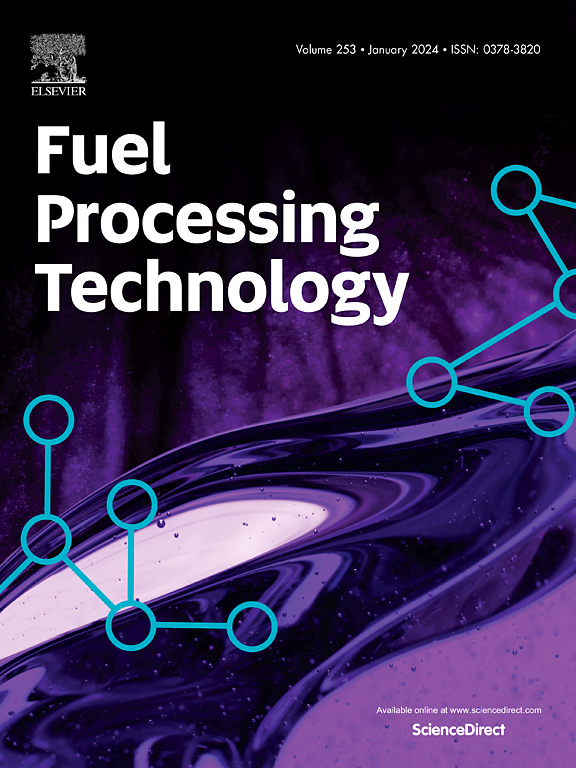甲烷蒸汽重整Ni基催化剂的支撑效应:MxOy-Al2O3 (M = Ni, Mg, Co)支撑对提高催化剂稳定性的作用
IF 7.7
2区 工程技术
Q1 CHEMISTRY, APPLIED
引用次数: 0
摘要
采用共沉淀法和Ni浸渍法制备了复合金属氧化物(NiO-Al2O3、MgO-Al2O3、Co3O4-Al2O3)负载Ni基催化剂,研究了负载组分对甲烷蒸汽重整催化剂稳定性的影响。加速失活方案(甲烷分解、高温烧结、水热氧化)表明水热氧化是不可逆失活的主要原因。10Ni/NiAl催化剂(10wt % Ni/ 10wt % NiO-Al2O3)经923 K水热处理后表现出明显的再生能力,完全恢复了活性。这是由于还原镍和容易还原的NiO共存,促进了快速的再活化。其他催化剂形成热稳定的NiAl2O4,导致永久失活。在973 K时,甲烷裂解的影响可以忽略不计,10Ni/NiAl催化剂的碳沉积最低(17.02%)。在1223 K的极端吹氢条件下,只有10Ni/CoAl催化剂的活性略有下降。10Ni/NiAl优异的稳定性归功于在973 K煅烧过程中原位形成的NiAl复合金属氧化物,它有效地锚定了Ni颗粒,抑制了烧结,防止了广泛的氧化。本文章由计算机程序翻译,如有差异,请以英文原文为准。
Support effect in Ni-based catalysts for methane steam reforming: Role of MxOy-Al2O3 (M = Ni, Mg, Co) supports for enhanced catalyst stability
Ni-based catalysts supported on composite metal oxides (NiO-Al2O3, MgO-Al2O3, Co3O4-Al2O3) were synthesized via coprecipitation followed by Ni impregnation to investigate the influence of support composition on catalyst stability in methane steam reforming. Accelerated deactivation protocols (methane decomposition, high-temperature sintering, hydrothermal oxidation) revealed hydrothermal oxidation as the primary cause of irreversible deactivation. The 10Ni/NiAl catalyst (10 wt% Ni/10 wt% NiO-Al2O3) showed remarkable regenerability after 923 K hydrothermal treatment, fully restoring its activity. This was attributed to coexisting reduced Ni species and readily reducible NiO, facilitating rapid reactivation. Other catalysts formed thermally stable NiAl2O4, leading to permanent deactivation. Methane cracking at 973 K had negligible effect, and 10Ni/NiAl catalyst exhibited the lowest carbon deposition (17.02 %). Under extreme hydrogen purged at 1223 K, only the 10Ni/CoAl catalyst exhibited a minor activity decline. The superior stability of 10Ni/NiAl was attributed to an in situ-formed NiAl composite metal oxides during 973 K calcination, which effectively anchored Ni particles, suppressed sintering, and prevented extensive oxidation.
求助全文
通过发布文献求助,成功后即可免费获取论文全文。
去求助
来源期刊

Fuel Processing Technology
工程技术-工程:化工
CiteScore
13.20
自引率
9.30%
发文量
398
审稿时长
26 days
期刊介绍:
Fuel Processing Technology (FPT) deals with the scientific and technological aspects of converting fossil and renewable resources to clean fuels, value-added chemicals, fuel-related advanced carbon materials and by-products. In addition to the traditional non-nuclear fossil fuels, biomass and wastes, papers on the integration of renewables such as solar and wind energy and energy storage into the fuel processing processes, as well as papers on the production and conversion of non-carbon-containing fuels such as hydrogen and ammonia, are also welcome. While chemical conversion is emphasized, papers on advanced physical conversion processes are also considered for publication in FPT. Papers on the fundamental aspects of fuel structure and properties will also be considered.
 求助内容:
求助内容: 应助结果提醒方式:
应助结果提醒方式:


